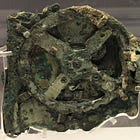Why Tether is actually more trust minimized than every single altcoin?
Trust minimization properties come in multiple forms and shapes. None of them is part of any altcoin's value proposition
In my last article about how violence is the ultimate dispute resolution mechanism I explained why scaling trust is so important. If violence is a critical part of the natural state of affairs, it means that trust doesn’t naturally scale.
We need institutions for that to happen, i.e. rules and protocols that align people’s incentives:
Again, Dawkins in his book “The Selfish Gene” explained how, by default, trust is circumscribed to very small groups of kin and he explains that the reason is that members of a tribe, family or clan share very similar genes.
Animals and humans in particular are actually machines that try to make sure that knowledge is preserved and hopefully spread out.
We are knowledge generation and preservation machines because we constantly want to make sure that either our genetic (genes) and explanatory (memes) knowledge survives the more the better by having as many kids as possible or that our ideas get out there the most (what I try with this newsletter by the way)
On why natality is decreasing worldwide that’s a different story I’ve been thinking quite a lot about lately, but it’s not the topic of this post.
You have aligned incentives with those you share genes with.
People that are kin share the same incentives as other kin members. Both want the preservation of their genes and that can only happen if folks take care of each other.
In other words, family is (or should be) a trust minimized environment.
Now let’s crazy extrapolate this idea to the financial industry:
The most widespread consensus model in finance is a federation made up by individual members.
National stock exchanges, clearing houses, central depositaries and even central banks are organized around a federation of members that share aligned incentives.
Typically an important part of the member’s business depends on the business run by that federation working properly. So a member will be taking care of that federation out of its own interest but also knows that other members will too.
The consequence is that these members trust their counterparts and consequently feel more comfortable doing business with them. Knowing your counterparts is everything in tradFi.
They reduce the need for trust by creating environments (federations) where all members have aligned incentives.
And yet a new crazy extrapolation: Bitcoin vs Tether vs altcoins
Bitcoin emerged centralized by Satoshi and then it decentralized itself organically in such a way that the community took over the project.
It turned from an experiment into a commodity.
You could claim that Bitcoin was an unregistered security until it became a commodity but the organic way it grew makes me think that legally that is not the case.
And even if it were, security as an asset would be that in which an issuer makes a promise to investors that has to fulfill. But Bitcoin didn’t even have a price nor an issuer. People naturally assigned it a price in the marketplace and we still don’t know who Satoshi is. And Satoshi didn’t have a goal to profit from his project as he has never touched the estimated 1m coins he holds.
So it doesn’t satisfy the Howey test, so it’s a commodity.
While with a security the only way to make an issuer fulfill such obligation is with laws that ensure their enforcement, a commodity on the other hand doesn’t have an issuer. A commodity is valuable because of its properties both the properties in the code and emergent ones as it’s the case with copper, corn or gold.
What are Bitcoin’s properties? Its trust minimization enables the institution of wealth transfer, as I have explained here in more detail:
That trust minimization is extremely valuable because it lets you own private property without the need for laws. This is something very useful everywhere with poor rule of law, like many emerging economies, but also cyberspace, where laws don’t work.
Who could have misaligned incentives with a Bitcoin user given this value proposition?
Well, anyone in Government because they will have a harder time enforcing some of its laws.
So Bitcoin users that hold their coins in a private manner don’t have aligned incentives with those of their government. Consequently governments would try to stop if they thought they could. But they can’t.
Altcoins OTOH are an entirely different story:
they emerged in centralized fashion, with easy to identify issuers
they issued unregistered securities which sent lots of money their way
Despite promising riches to investors in white papers of every possible fancy format, they don’t need to fulfill any obligation with them, so if its price crashes over and over again removing money from the hands of investors, that’s not their responsibility. In other words, issuers are not liable for fulfilling their promises to investors.
All decisions, developer, marketing, roadmap teams are clearly centralized under the “foundation” umbrella. The reason by the way to create a “foundation” is to make sure there is no apparent goal to make money (which would deem them instantly an unregistered security by authorities).
Since being the second most trust minimized coin is an idiotic value proposition, they promise unsuspecting investors properties that only get better the more centralized they are (like scalability, UI/UX, etc…)
So what we see is that those that promised a second best trust minimization crash respect to Bitcoin but as long as the market values their casino like properties, there will be a price even if very close to zero, which means folks will be able to hold some value in their pockets without any government being able to enforce its laws.
So governments could try to stop them. But they don’t. Why don’t they?
Well, IMO because the amounts of money raised with those altcoins have been spent in obscene ways to pay:
exchanges
custodians
developers
issuers
so that they could claim traction and with it, attract others, but more importantly, to lobby governments. And it seems to have worked by the looks of the sheer amount of scammers that are nowhere near any prison.
So both Bitcoin and altcoins have misaligned incentives with governments but the former can’t be attacked while the latter are not attacked due to outright corruption.
In other words: altcoins are not trust minimized, but so far it hasn’t mattered because they seem to have bought their way into some sort of legality, as crazy as it may sound.
But how long can that last? First, for as long as their foundations don’t run out of money and secondly, for as long as people don’t understand this and especially for as long as those that have lost obscene amounts of money don’t claim their governments to take measures against those responsible for such a shitshow.
You’ll have to trust that doesn’t happen. Your altcoins there will be at risk because even it it doesn’t happen, it still can given that altcoin foundation’s incentives are misaligned with those from the people that lost their money with them.
And since while the West is still (even if only a shadow of) the West, governments should represent the people and so it could happen that they end up demanding responsibilities.
What about Tether?
Governments can attack Tether indeed, but turns out the country with the biggest power to make such a thing happen worldwide is the same one with aligned incentives with Tether.
Tether buys US treasuries at a moment when US debt has ballooned and is in dire need of more buyers so as not to risk defaulting.
Tether is a new distribution channel for the USD and consequently for US debt and I find absolutely no reason why the US should try to stop it.
Tether as I explained down here, is the biggest exporter of US rule of law, way more effective and efficient than the powerful (and expensive) US military, so perhaps a better choice to achieve similar goals.
Tether is consequently more trust minimized than altcoins simply because that which can attack it, is most likely not to due to aligned incentives.
Conclusion
1- Bitcoin has misaligned incentives with those that can attack it, but it can’t be attacked, while all its users (miners, developers and holders) have identical incentives.
2- Altcoins have misaligned incentives with those that can attack them and although they are currently not attacked, they risk:
Their foundations running out of money
Voters demanding their governments to go after altcoin issuers despite the massive amounts of money paid to lobby them. But since they will run out of money, at some point they will not be able to lobby any longer. So at risk of being attacked.
So you have to trust the people that already have lost money and the people that will keep losing money, to not demand their governments to go after altcoin issuers.
3- Tether has aligned incentives with the ultimate issuer of the USD and with its users:
Tether is increasingly important as a buyer of US debt and as the exporter of the US rule of law
Tether’s leadership would be extremely dumb to do something that risks its users wealth, because no other business in history AFAIK has been able to make such obscene profits with such a low number of employees.
So your wealth held in tether has little risk because even if the blockchain where it is held goes down, you can always claim your tether back in another chain either via an exchange or by signing your wallet with your own keys. In fact, you could make the case that the US government should protect Tether at all costs.









As usual, epic🥃